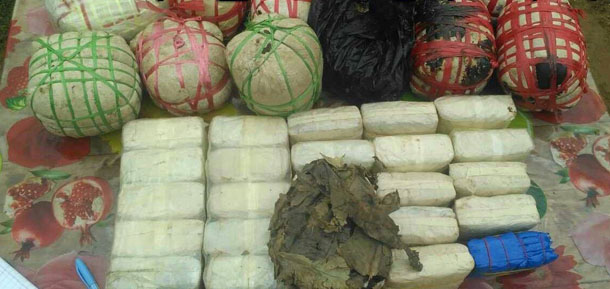RANGOON — The Ta’ang National Liberation Army (TNLA) says it has detained six people and seized drugs with an estimated street value of nearly 200 million kyats (US$167,000) in northern Shan State, marking the ethnic armed group’s second largest drug bust ever.
The seizure included more than 10 viss (16 kilograms) of raw opium and 119,400 methamphetamine tablets, with the alleged drug couriers outed at a TNLA checkpoint on the road linking the towns of Minewee and Mantong over the weekend.
TNLA spokesman Mai Aike Kyaw told The Irrawaddy that the narcotics haul was second only to a seizure in March that amounted to $3.5 million in heroin and methamphetamine pills.
“Our army set up checkpoints and checked everyone on the road from Mantong and Minewee,” Mai Aike Kyaw said. “Our intention is to crack down on the illegal drug trade. We uncovered two separate cases [on Saturday] in which they drove motorbikes and were trafficking illegal drugs.
“Firstly we found raw opium hidden in a basket, which totaled 10 viss, and seized 80,000 tablets of amphetamines from two motorbikes [ridden] by four people. This was 10:00 [am] local time. In a second case, 39,400 amphetamine tablets were seized from a couple who drove a motorbike,” he said, adding that the TNLA was not acting on a tip and discovered the narcotics during a routine check of vehicles passing through the area, which is largely populated by Palaung, an ethnic minority also known as Ta’ang.
The TNLA spokesman said the drugs came from an area in Shan State controlled by the Pansay militia, an armed group led by Kyaw Myint, a member of the ruling Union Solidarity and Development Party (USDP) representing Namkham Township in the Shan State parliament. The Pansay militia allows locals to cultivate opium poppies in the territory it controls and levies a tax on those who do.
The TNLA is investigating the nature of the six detainees’ role in the narcotics trade to determine whether they are traffickers or merely drug mules, according to Mai Aike Kyaw.
During last year’s opium cultivation season, which typically begins in October, the TNLA came to sporadic blows with Pansay soldiers as it undertook a campaign to eradicate cultivation of opium poppies in the townships of Namkham and Mantong along the Sino-Burmese border.
Northern Shan State has also seen fighting in recent years between the Burma Army and the TNLA. The Palaung rebels, unlike most of Burma’s armed ethnic groups, do not have a bilateral ceasefire with the government.
The TNLA says it is carrying out drug eradication operations in the area to stem rampant drug abuse among Palaung communities. The rebels and Palaung NGOs have alleged that pro-government militias in the region are producing drugs and peddling them in minority communities.

















